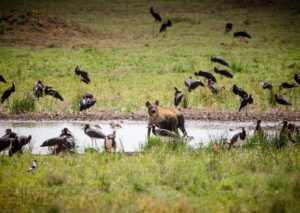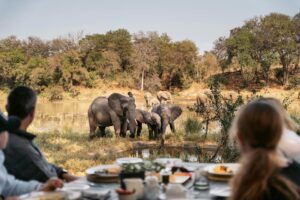How to Plan the Perfect African Safari Trip?
Planning an African safari trip can be one of the most exciting adventures of a lifetime. Whether you dream of seeing lions in the wild or exploring vast, untouched landscapes, a safari can bring those dreams to life. In this blog, you will learn all the important details about how to plan your safari, what to expect, and tips for making the most of your trip.
Choosing the Right Time for Your Safari
Timing plays a crucial role in ensuring your African safari vacations are memorable. The best time to visit Africa for a safari largely depends on the wildlife you want to see and the region you plan to explore. Most travelers prefer visiting during the dry season when animals gather around water sources, making them easier to spot.
However, different countries in Africa have varying climates, and understanding the best months to visit can enhance your safari experience. For instance, in East Africa, the Great Migration, where millions of animals move in search of greener pastures, happens between June and October. Conversely, in southern Africa, the dry season spans from May to October.
While the dry season offers great opportunities for wildlife viewing, the wet season, typically from November to April, has its advantages too. The landscapes are lush and green, birdwatching is excellent, and newborn animals start to appear, adding to the charm of your safari.
Selecting the Best Safari Destination
Africa is vast, and each country offers something unique in terms of wildlife and landscapes. Deciding where to go on your African safari depends on the type of experience you want. Here are a few popular safari destinations to consider:
- Kenya and Tanzania: These countries are famous for the Great Migration and the iconic Maasai Mara and Serengeti parks. Here, you can witness herds of wildebeests and zebras migrating across the plains, while lions and crocodiles stalk them.
- South Africa: Known for the famous Kruger National Park, South Africa offers excellent infrastructure, making it a convenient destination for first-time safari travelers. You can experience the Big Five here—lions, leopards, rhinos, elephants, and buffalo.
- Botswana: If you want a more secluded experience, Botswana’s Okavango Delta and Chobe National Park are perfect for seeing elephants and enjoying serene waterways.
- Namibia: With its dramatic deserts and dunes, Namibia offers unique landscapes and the opportunity to see rare wildlife, like the desert-adapted elephants and rhinos.
Each destination has its appeal, and choosing the right one will depend on whether you prioritize specific wildlife sightings, landscapes, or cultural experiences.
Deciding on the Type of Safari
After choosing your destination, the next important decision is what type of safari you want to go on. African safaris come in different styles, each offering a unique way to experience the wild.
Guided Safaris
Guided safaris are the most popular type, especially for first-time travelers. In these, an expert guide takes you around in a 4×4 vehicle, sharing knowledge about the animals and landscapes. Guided safaris ensure you don’t miss any key sightings, as your guide will know the best places to spot wildlife.
Self-Drive Safaris
For those who enjoy a bit of adventure and freedom, self-drive safaris allow you to explore at your own pace. You can rent a vehicle and drive through the national parks on your own. However, this option requires more preparation, as you will need to be familiar with the park’s layout, rules, and safety guidelines.
Walking Safaris
For a more intimate experience with nature, walking safaris offer the chance to explore the bush on foot, accompanied by a guide. Walking safaris are thrilling because you can get much closer to the animals, learning about the small details of the environment that you would miss in a vehicle.
Luxury Safaris
If comfort and luxury are high on your list, a luxury safari is the way to go. These safaris provide high-end accommodation, gourmet meals, and often, private guides. You’ll stay in luxurious lodges or tented camps that blend comfort with the adventure of being in the wild.
Preparing for Your Safari
Once you’ve selected your safari destination and type, it’s time to start preparing for the trip. Planning ahead ensures you have everything you need for a smooth and enjoyable adventure.
Vaccinations and Health
Before traveling to Africa, it’s essential to check what vaccinations you may need. Depending on the country you are visiting, you may require vaccinations for yellow fever, hepatitis, or typhoid. Additionally, many safari destinations are in malaria zones, so taking anti-malarial medication is recommended.
Packing Essentials
Packing the right items for your safari will make your trip more comfortable and enjoyable. Some of the key things to bring include:
- Lightweight, neutral-colored clothing: Bright colors can attract insects and disturb animals, so stick to earthy tones like khaki, brown, or olive.
- Sunscreen and hats: The African sun can be intense, so protection is a must.
- Binoculars: To get the best views of distant wildlife, a good pair of binoculars is essential.
- Camera with extra batteries: You will want to capture the breathtaking moments, so ensure your camera is ready for action.
Remember, you might be staying in remote locations, so bring any necessary medications and personal hygiene items with you.
Respecting Wildlife and Nature
An African safari is a rare opportunity to see wild animals in their natural habitat, and it is important to respect them and the environment. Always follow the guidance of your safari guide, keep a safe distance from the animals, and never leave any trash behind. Being respectful ensures that the wildlife and their habitat remain undisturbed for future generations to enjoy.
Conclusion
Planning an African safari trip can be an exciting and fulfilling adventure. By choosing the right time, destination, and type of safari, you can ensure a memorable experience. Proper preparation, including vaccinations, packing the right gear, and respecting the environment, will further enhance your trip. Whether you’re spotting the Big Five in South Africa or witnessing the Great Migration in Kenya, your safari will offer unforgettable encounters with nature.














Post Comment